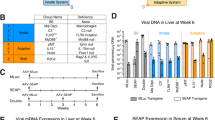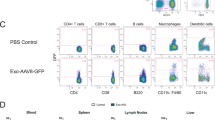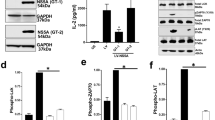Abstract
The administration of soluble muCTLA4Ig around the time of adenovirus vector mediated gene transfer into murine hepatocytes has been shown to markedly prolong transgene expression, diminish the formation of adenovirus neutralizing antibody, decrease T cell proliferative response and infiltration into the liver without causing irreversible systemic immunosuppression. In this study, an E1/E3-deleted adenovirus vector constitutively expressing murine CTLA4Ig (Ad.RSV-muCTLA4Ig) was constructed in order to determine if production of muCTLA4Ig from within transduced cells (ie hepatocytes) would provide a more specific/localized interference with the CD28/B7–1 and B7–2 signaling pathways, and thus result in prolonged transgene expression in vivo at nonimmunosuppressive serum concentrations. In contrast to C3H mice receiving a control adenovirus, transduction with 6 × 109 p.f.u. of Ad.RSV-muCTLA4Ig and a reporter adenovirus (2 × 109 p.f.u. of Ad.PGK-hAAT) resulted in prolonged reporter gene expression, reduced anti-adenovirus and anti-hAAT antibody production, and attenuated T cell proliferation and IFN-γ production in response to adenoviral vector. Mice given a constant total amount of adenovirus with diminishing amounts of Ad.RSV-muCTLA4Ig and a constant amount of reporter virus (2 × 109 p.f.u. of Ad.PGK-hAAT) demonstrated prolonged reporter gene expression and decreased anti-adenovirus and anti-hAAT antibody production only when high serum levels of muCTLA4Ig were produced. Taken together, these findings suggest that a certain threshold of muCTLA4Ig must be achieved to alter the immune responses and prolong transgene expression from adenoviral vectors.
This is a preview of subscription content, access via your institution
Access options
Subscribe to this journal
Receive 12 print issues and online access
$259.00 per year
only $21.58 per issue
Buy this article
- Purchase on Springer Link
- Instant access to full article PDF
Prices may be subject to local taxes which are calculated during checkout
Similar content being viewed by others
Author information
Authors and Affiliations
Rights and permissions
About this article
Cite this article
Schowalter, D., Meuse, L., Wilson, C. et al. Constitutive expression of murine CTLA4Ig from a recombinant adenovirus vector results in prolonged transgene expression. Gene Ther 4, 853–860 (1997). https://doi.org/10.1038/sj.gt.3300466
Received:
Accepted:
Issue Date:
DOI: https://doi.org/10.1038/sj.gt.3300466
Keywords
This article is cited by
-
Strategies to Modulate Immune Responses: A New Frontier for Gene Therapy
Molecular Therapy (2009)
-
Loss of Transgene following ex vivo Gene Transfer is Associated with a Dominant Th2 Response: Implications for Cutaneous Gene Therapy
Molecular Therapy (2007)
-
Loss of Transgene following ex vivo Gene Transfer is Associated with a Dominant Th2 Response: Implications for Cutaneous Gene Therapy
Molecular Therapy (2007)
-
Therapeutic short hairpin RNA expression in the liver: viral targets and vectors
Gene Therapy (2006)
-
Identification of multiple genetic loci that regulate adenovirus gene therapy
Gene Therapy (2004)



